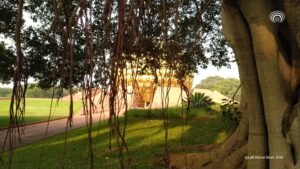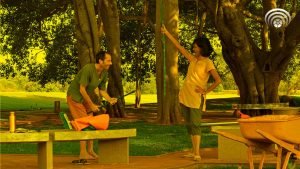Auroville is a unique experimental township located in the state of Tamil Nadu in India, that has been dedicated to sustainable living since its inception in the 1960s. In the quest for a sustainable lifestyle, Aurovillians have adopted various innovative practices in renewable energy and waste management. In this article, we will explore some of the practices that have made Auroville a role model for sustainable living.
Renewable Energy: One of the primary goals of Auroville is to reduce its carbon footprint and become energy self-sufficient. To achieve this goal, the community has adopted several innovative practices in renewable energy. The most prominent of these is the extensive use of solar energy. Auroville has installed a large number of solar panels throughout the community to harness the power of the sun. These panels provide electricity to households, businesses, and community facilities, including the Matrimandir, Auroville’s spiritual center. In addition to solar energy, Auroville also utilizes wind power, biogas, and other forms of renewable energy.
Waste Management: Auroville has also adopted several innovative practices in waste management. The community aims to reduce waste generation and maximize recycling and reuse. To achieve this, Auroville has implemented a comprehensive waste management system that involves waste segregation, composting, and recycling. The community has established a centralized waste collection system that segregates waste at the source. This segregated waste is then processed through various methods such as composting, vermiculture, and biogas production. The community has also established a waste exchange program where waste materials are exchanged between individuals and businesses to minimize waste generation.
Auroville has also been experimenting with sustainable living practices such as organic farming, natural building, and water conservation. The community has several organic farms that practice permaculture and grow a variety of crops without the use of chemical fertilizers and pesticides. The farms also use techniques like crop rotation and intercropping to maximize yields and promote soil health.
In terms of natural building, Auroville has been experimenting with various eco-friendly building materials such as rammed earth, compressed stabilized earth blocks, and bamboo. These materials are locally available, low cost, and have low environmental impact. The buildings constructed with these materials are energy-efficient, sustainable, and promote healthy living.
Water conservation is also a crucial aspect of sustainable living in Auroville. The community has implemented several water conservation measures such as rainwater harvesting, water recycling, and drip irrigation. The community has constructed several small and large-scale rainwater harvesting structures, including ponds, check dams, and percolation pits, to recharge groundwater and improve soil moisture levels.
Auroville has also established several community-based projects and businesses that promote sustainable livelihoods. These include the Auroville Village Action Group (AVAG), which works with women in the surrounding villages to promote sustainable livelihoods through various income-generating activities such as handicrafts and organic farming. The community also has several businesses that promote sustainable practices, such as Auroville Solar Kitchen, which serves vegetarian meals cooked with solar energy.
In conclusion, Auroville’s sustainable living practices are a testament to the community’s commitment to creating a sustainable future. By adopting innovative practices in renewable energy, waste management, organic farming, natural building, and water conservation, Auroville has become a role model for sustainable living. The community’s approach to sustainable livelihoods through community-based projects and businesses provides a glimpse into how sustainable living can be integrated into every aspect of our lives.



